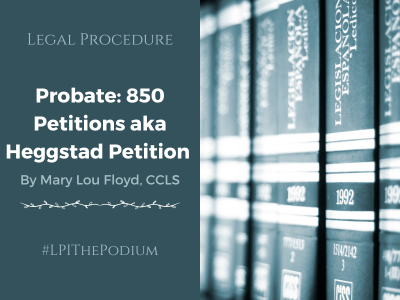
By: Mary Lou Floyd, CCLS
Mt. Diablo LPA recently presented a webinar entitled, “Probate Code 850.” Attorney Azita Rahim (Johnston, Kinney & Zulaica LLP) was the speaker.
Ms. Rahim introduced us to 850 Petitions and provided us with information to be able to prepare this type of petition. Below is a summary of the important items Ms. Rahim spoke about to assist us in preparing an 850 Petition.
The 850 Petition and the Order thereon are not Judicial Council forms but customized pleadings. The only Judicial Council form you use is DE-115, Notice of Hearing on Petition to Determine Claim to Real Property. You may also use Proofs of Personal Service which are also Judicial Council forms.
The exhibits to include are the Trust, Schedule A of the Trust, Pour-over Will, General Assignment, Deeds, and Bank Statements. The exhibits need to show the intent of the trustor to include the property in the Trust.
The cases to cite to are Estate of Heggstad (1993) 16 Cal.App.4th 943; Kucker v. Kucker (2011) 192 Cal.App.4th 90; and Ukkestad v. RBS Asset Finance (2015) 255 Cal.App.4th 156.
Estate of Heggstad – involves real property clearly identified in the trust document but no deed prepared to transfer the real property into the trust.
Kucker v. Kucker – stock/securities inadvertently left out of the trust but the General Assignment included any and all stock/securities.
Ukkestad v. RBS Asset Finance – two parcels of real property were not mentioned in Schedule A of the trust nor were they transferred into the trust. However, the General Assignment included any and all real property.
Notice should be given to “any person having an interest in the real property, a beneficiary, a trustee, or a successor trustee.” You must use Form DE-115, Notice of Hearing on Petition to Determine Claim to Real Property. Under Item 3 (on Page 1), you must clearly identify the property that is in dispute. Ms. Rahim informed us that this Notice must be personally served on the personal representative and any person claiming an interest in or having possession of the property in dispute. Pursuant to CCP sections 413.10-417.40, the notice must be served at least 30 days before the hearing. Also, a Summons should be prepared and issued by the court. There was much discussion about the issuance of a Summons. There are courts that will not issue a Summons for this type of matter. Please check with your local court about this part of the procedure.
If the property that is in dispute is being held by a financial institution, you must personally serve the financial institution.
When filing the Notice with the court, the hearing may be scheduled in 30 days. Keep a buffer of 5-6 days and bring your attorney’s available dates with you. You want the buffer to ensure you are able to personally serve all interested parties.
After you file the Petition, get the hearing date, serve the Notice of Hearing, and attend the hearing, the judge will issue an Order. You must get a certified copy of the order to record with the clerk-recorder’s office whichever county the real property is located in. If stock/securities are held in different financial institutions, obtain certified copies for each financial institution in order to transfer the stock/securities into the trust.
Note: this is only the viewpoint of the writer. Each circumstance may be influenced by other factors.
Categorized in: Legal Procedure
| << previous | next >> |








